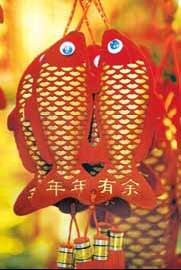Ma Dan/Shanghai Daily news

The city has been decorated in red - red lanterns, red Chinese knots and red
Spring Festival couplets.
Today is the last day of the Year of the Rooster
and a joyful holiday atmosphere prevails in the city.
The whole city is well
prepared for the jamboree to celebrate the most important Chinese festival - the
Spring Festival.
The festival falls on the first day of the first lunar
month, often one month later than the Gregorian calendar. It originated in the
Shang Dynasty (c. 16th century-11th century BC) from the people's sacrifice to
gods and ancestors at the end of an old year and the beginning of a new
one.
All family members will get together, just like Christmas in the West.
Many customs accompany the Spring Festival, most of which are still followed
today, such as bai nian, to pay a New Year call.
People visit relatives,
neighbors and friends, exchanging greetings and gifts to wish them all the best
for the New Year.
The New Year call always starts with the greetings such as
"xinnian hao," (Happy New Year) or in Beijing style "gei nin bainian le" (Happy
New Year to you). There will never be enough blessing words, such as "suisui
ping'an" (peaceful all year round), "jinyu mantang" (treasures fill the home)
and "jixiang ruyi" (everything goes well).
The younger generation should call
on their elders first, such as the grandparents and parents, wishing them "good
health" and "long life." Then they will get "hongbao" as a New Year gift, which
are always red packets containing lucky money. Those who receive them are
expected to give New Year greetings.
After that, people call on their
relatives, friends and neighbors. As a "big tangerine" is a homonym for "very
lucky" in Chinese, so people often present big, red tangerines as a New Year
gift. Visitors eat candies while paying New Year calls and receiving the
greetings from the people they visit - tiantian mimi (be happy the following
whole year).
The traditional New Year activity, bai nian, is gradually added
with more contents and methods. People nowadays also use some high-tech ways to
send greetings. Telephone and Internet are the new messengers to spread good
wishes.
In China, most minorities celebrate their Spring Festival almost the
same day as the Han people, but they have different
customs.
Useful blessings:
"Jin yu man tang" -
treasures fill the home
"Shengyi xinglong" - business flourishes
"Suisui
ping'an" - peace all year round
"Gongxi facai" - wishing you
prosperity
"Heqi sheng cai" - harmony brings wealth
"Xin xiang shi cheng"
- may all your wishes come true
"Jixiang ruyi" - everything goes
well
"Zhao cai jin bao" - money and treasures will be plentiful
"Yi fan
feng shun" - Wishing you every success
"Bu bu gao sheng" - Promoting to a
higher position



